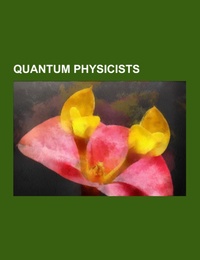-
Zusatztext
-
Source: Wikipedia. Pages: 111. Chapters: Richard Feynman, Erwin Schrödinger, Niels Bohr, Max Planck, Werner Heisenberg, Enrico Fermi, Paul Dirac, Roger Penrose, Wolfgang Pauli, Louis de Broglie, John Bardeen, William Shockley, Max Born, Walter Houser Brattain, John Stewart Bell, Gustav Ludwig Hertz, Arnold Sommerfeld, Howard Brandt, Nikolay Bogolyubov, David Bohm, Hugh Everett III, Vladimir Korepin, Arthur Compton, Pieter Zeeman, F. J. Duarte, Anton Zeilinger, Paul Davies, Jim Al-Khalili, Anirudh Singh, Mehdi Golshani, Daniel Lidar, John Clive Ward, Nathan Rosen, George Karreman, James Franck, H. Stanley Allen, Helmut Hönl, Walther Kossel, Alfred Landé, Gregor Wentzel, Erwin Fues, Heinrich Welker, Peter Zoller, Adolf Kratzer, Karel Niessen, Artur Ekert, Karl Bechert, Pascual Jordan, Jonathan Dowling, Boris Podolsky, Anita Goel, Winston H. Bostick, Leigh Page, Wojciech Rubinowicz, Rainer Blatt, Rudolf Grimm, Willis Lamb, John Rarity, Sergei Tyablikov, Raymond Chiao, Dmitry Shirkov, Richard Dalitz, Neil F. Johnson, Samuel L. Braunstein, Howard M. Wiseman, Ray Streater, Arun K. Pati, David K. Ferry, Poul S. Jessen, Ross H. McKenzie, Jens Eisert, Julio Gea-Banacloche, Martin Bojowald, Ataç Imamoglu, Kirill Gurov, Carlton M. Caves, Konrad Bleuler, Arthur Jaffe, Jan Sladkowski, Apoorva D. Patel, Michele Mosca, Charles Kittel, Peter D. Jarvis, Francesco Sannino, Christoph Helmut Keitel, Edward W. Piotrowski, Wojciech H. Zurek, Taksu Cheon, Mioara Mugur-Schächter, Suraj N. Gupta, Arthur Edward Ruark, Christian Møller, Kurt Symanzik, Dirk Bouwmeester, Chad Orzel, H. Dieter Zeh, Marvin D. Girardeau. Excerpt: Werner Heisenberg (5 December 1901 - 1 February 1976) was a German theoretical physicist who made foundational contributions to quantum mechanics and is best known for asserting the uncertainty principle of quantum theory. In addition, he made important contributions to nuclear physics, quantum field theory, and particle physics. Heisenberg, along with Max Born and Pascual Jordan, set forth the matrix formulation of quantum mechanics in 1925. Heisenberg was awarded the 1932 Nobel Prize in Physics for the creation of quantum mechanics, and its application especially to the discovery of the allotropic forms of hydrogen. Following World War II, he was appointed director of the Kaiser Wilhelm Institute for Physics, which was soon thereafter renamed the Max Planck Institute for Physics. He was director of the institute until it was moved to Munich in 1958, when it was expanded and renamed the Max Planck Institute for Physics and Astrophysics. Heisenberg was also president of the German Research Council, chairman of the Commission for Atomic Physics, chairman of the Nuclear Physics Working Group, and president of the Alexander von Humboldt Foundation. Heisenberg was born in Würzburg, Germany to Kaspar Earnesta August Heisenberg, a secondary school teacher of classical languages who became Germany's only ordentlicher Professor (ordinarius professor) of medieval and modern Greek studies in the university system, and his wife Annie Wecklein. He studied physics and mathematics from 1920 to 1923 at the Ludwig-Maximilians-Universität München and the Georg-August-Universität Göttingen. At Munich, he studied under Arnold Sommerfeld and Wilhelm Wien. At Göttingen, he studied physics with Max Born and James Franck, and he studied mathematics with David Hilbert. He received his doctorate in 1923, at Munich under Sommerfeld. He completed his Habilitation in 19.
-
Detailansicht
Quantum physicists
Richard Feynman, Erwin Schrödinger, Niels Bohr, Max Planck, Werner Heisenberg, Enrico Fermi, Paul Dirac, Roger Penrose, Wolfgang Pauli, Louis de Broglie, John Bardeen, William Shockley, Max Born, Walter Houser Brattain, John Stewart Bell
ISBN/EAN: 9781155254210
Umbreit-Nr.: 6813509
Sprache:
Englisch
Umfang: 112 S.
Format in cm: 0.7 x 24.6 x 18.9
Einband:
kartoniertes Buch
Erschienen am 06.06.2014
Auflage: 1/2014


